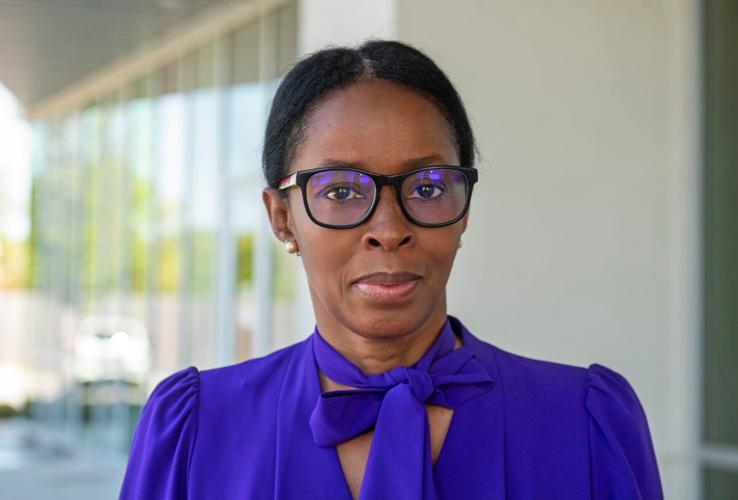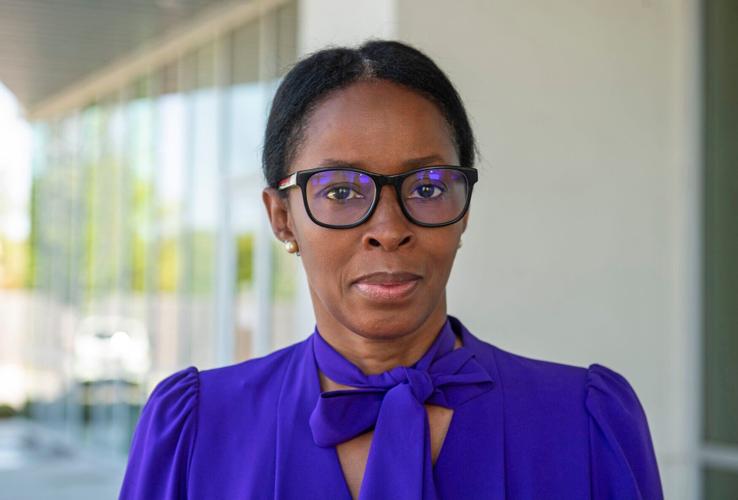She stepped gingerly to the witness stand with the help of a cane. She spoke calmly, occasionally looking at jurors and flashing an affirming smile as she answered questions.
More than 2½ years after filing a federal lawsuit against her former employer, former LSU recruiting administrator Sharon Lewis testified in court Monday about the mistreatment she says she endured while working for the university’s football program.
“It was one of the worst experiences of my life,” a sobbing Lewis said, while detailing run-ins she had with fellow coaching staff members like ex-football coach Les Miles.
Lewis spent nearly 21 years in the Tigers football operations office before she was fired in February 2022. She was one of more than 40 staff members laid off in the weeks after Brian Kelly took over as head coach of LSU’s football team in December 2021.
Attorneys representing LSU's Board of Supervisors said she was simply among the casualties of a coaching change and Kelly wanting to hire his own staff.
In her court filings, Lewis alleges her termination was an act of retaliation tied to her litigation against the university and sexual misconduct complaints against Miles that she reported years prior.
Lewis' attorneys rested their case at the end of Monday's proceedings, on the fifth day of testimony. The plaintiff spent nearly five hours on the witness stand detailing a recruiting office rife with sexual harassment and discrimination.
Lewis has accused LSU leaders of conspiring to cover up Title IX complaints in the athletics department to protect coaches and star athletes. Title IX is a federal law that prohibits sex-based discrimination on university campuses.
Lewis and her legal team have sought to prove that she was subjected to a hostile workplace environment for years.
Jurors listened as Lewis chronicled her early years in the program working under former LSU coach Nick Saban, who she described as a mentor and master scout of football talent who “was all about business.”
She said she noticed an immediate change when Miles assumed the head coaching position. Turmoil began when Miles ordered Lewis, who oversaw a team of about 75 student workers at the time, to hire prettier female employees, she testified.
Lewis told jurors Miles was fixated on the look of the young workers from the outset and demanded the female students in the recruiting office ditch their business suits and begin wearing skirts to events.
“I want the blondes over the brunettes to be the face of recruiting,” Lewis said Miles told her at their first meeting. “And then he got up and left.”
In 2012 and 2013, Lewis reported sexual misconduct allegations that two female students made to her about Miles. One of the students said Miles drove her behind the football operations building and kissed her without her consent, according to complaints submitted as part of trial evidence.
Lewis said Miles began targeting her after he became aware she reported him to athletics department officials. She said after officials took no disciplinary action against him, Miles ramped up his demands and told her to hire more “blonde women with big boobs” because he thought there were too many “fat, Black or ugly” student workers in the recruiting office.
At one point, Lewis testified, Miles cleared out a meeting and threatened to punch her for not complying with his directives. His verbal assaults and angry glares became so overwhelming that Lewis began hiding beneath her desk whenever she heard Miles enter the building, she indicated.
“I would avoid him. I just wanted to do my job,” she said.
Lewis went on to testify that assistant coach Frank Wilson sexually harassed her and began sabotaging her when she rebuffed his sexual advances during Miles' tenure. Two women testified earlier in the trial that Wilson sexually harassed them.
One of the most explosive allegations in the Lewis case centers around Wilson. She said he walked into her office in 2013, closed the door and exposed himself, then asked her to touch his genitals. It's an allegation Lewis never made public until she amended her lawsuit in March 2022, nearly a year after she originally filed suit.
Attorneys for LSU challenged Lewis on the timing of that allegation, asking why she never came forward with the accusation against Wilson until after she was fired.
"I put that in the back of my mind. I didn't want to relive it," Lewis testified. "I was traumatized. It was one step away from rape for me."
LSU athletics officials have defended Wilson, saying they have not found evidence of misconduct.
Wilson ended his first stint at LSU in 2016 and coached at the University of Texas-San Antonio and McNeese State University. He returned to LSU in December 2021 after Kelly took the reins. Lewis and her attorneys contend that Kelly, when he was deposed, said he did not make the decision to fire Lewis and was told by the athletics director that she was "hands off" because of her pending lawsuit.
LSU board member Collis Temple Jr. testified last week that he and Wilson were longtime friends and he arranged a meeting at his house with Wilson and LSU President William Tate IV prior to Wilson's rehiring. Lewis on Monday said she suspects the three agreed to terminate her at the meeting as a condition to bring Wilson back to the coaching staff.
Tate testified Monday afternoon and said Temple only introduced him and Wilson during the get-together and they never talked about rehiring him. Tate acknowledged signing off on Wilson's $400,000, multi-year contract, but said it was a perfunctory duty in his role as president. Kelly made the decision to hire Wilson, Tate told jurors.
"I'm just the conduit of the contracts," he said. "Coach after coach after coach is hired by the head coach. It's pretty transparent. It happens hundreds of times in the world that I live in."




